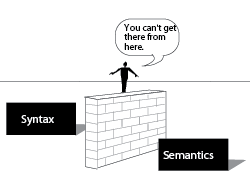The Syntax-Semantics Barrier
Axiom 1: programs are formal (syntactic). Axiom 2: human minds have mental contents (semantics). Axiom 3: syntax by itself is neither constitutive of nor sufficient for semantics. Conc: programs are neither constitutive of nor sufficient for minds.
John Searle, 1990b , p.27.

Syntax & Semantics Syntax and semantics are widespread notions in linguistics, philosophy, and cognitive science. Traditionally, syntax and semantics are branches of linguistics, syntax being the study of how words are arranged into sentences, semantics being study of meaning of language.
In philosophy, semantics generally involves questions of
reference (how terms or names correspond to objects in the world) and
truth (whether combinations of terms, as in a statement or sentences, correspond to facts in the world).
Syntax generally concerns the abstract structure of formal systems (e.g., rules regarding the ordering & manipulation of terms in predicate logic).
In Searle's Chinese Room argument,
syntax is used to refer to formal structure or shape—the abstract ordering of the squiggles and squoggles and the relations the rulebook sets up between them.
Semantics is used to refer to an actual understanding of what the squiggles and squoggles mean in Chinese.
This is not, however, to say that everyone who addresses Searle understands these terms in the same way.
It may be helpful to note that in the context of the Chinese Room debate, syntax is often taken to be synonymous with such phrases as formal structure and computational form, and semantics is often taken to be synonymous with such terms as understanding, meaning, intentionality, and phenomenology.